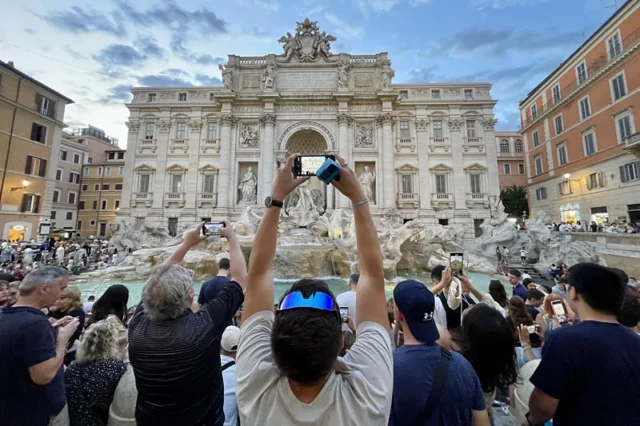Rethinking Tourism: Embracing the Power and Responsibility of Travel
Introduction: Rethinking Tourism
In the modern era, the concept of being a tourist has garnered a mixed reputation. Paige McClanahan’s new book, The New Tourist: Waking Up to the Power and Perils of Travel, invites readers to reconsider what it means to be a tourist. By examining the transformative impact of tourism on destinations worldwide, McClanahan urges us to embrace the label of “tourist” with a renewed sense of responsibility and purpose.
Embracing the Label of Tourist
“There are so many tourists here,” I remarked to my friend, an Italian American living in Rome, as we navigated through crowded streets near the Spanish Steps on a hot June evening. This is a sentiment I have often expressed during my travels over the past two decades. Like many, I have preferred to identify as a “traveller” rather than a “tourist,” influenced by Anthony Bourdain’s advice to “be a traveller, not a tourist.”
However, the post-pandemic travel boom has highlighted the negative connotations associated with the term “tourist.” Tourists are often blamed for overcrowding, environmental degradation, and cultural insensitivity. But McClanahan’s book challenges us to rethink this perspective.

The Dual Nature of Tourism
McClanahan, an American journalist based in France, explores how tourism can both uplift and devastate destinations. From last-chance tourism amid the climate crisis to the influence of social media on travel, she delves into the complex dynamics at play. For instance, while tourism can revive economies, as seen in Iceland, excessive tourism can overwhelm local communities and natural resources.
“Does tourism build up our world or tear it apart? The answer to both questions is ‘Yes’,” McClanahan writes. This duality is central to understanding the power and responsibility of being a tourist.
Accepting Our Role as Tourists in Rethinking Tourism
In an interview with McClanahan, she explains the importance of embracing the label of “tourist.” Stigmatizing the term creates a divide that hinders self-reflection and accountability. By recognizing that we are all tourists when we travel, we become more aware of our impact and potential for positive change.
“We need to elevate our expectations of what it means to be a tourist,” McClanahan asserts. By doing so, we can transform tourism into a force for good, fostering mutual respect and understanding.
The Responsibility of Last-Chance Tourism
One chapter of McClanahan’s book addresses last-chance tourism, where travelers visit endangered sites before they disappear due to climate change. She argues that site managers have a duty to educate visitors, turning these trips into meaningful experiences that inspire environmental stewardship.

For instance, visiting the Mer de Glace glacier in the French Alps should go beyond mere sightseeing. Educational efforts and fostering an emotional connection to the site can motivate visitors to adopt more sustainable behaviors.
Social Media’s Influence on Travel
McClanahan also examines the role of social media in shaping travel experiences. While social media democratizes travel storytelling, allowing diverse voices to be heard, it also poses challenges. The responsibility lies with both content creators and consumers to use this platform thoughtfully.
“Social media is the modern form of travel writing,” McClanahan notes. As such, it has the power to shape perceptions and behaviors. Responsible storytelling can promote deeper understanding and respect for the places we visit.
Addressing Overtourism: Shared Responsibility
Overtourism is a pressing issue, with cities and tourist sites often overwhelmed by visitors. McClanahan argues that both travelers and governments share responsibility for managing tourism sustainably.
Governments play a crucial role in regulating tourism and protecting residents’ interests. For example, Barcelona and Amsterdam both aggressively promoted tourism, leading to significant challenges. Effective governance and thoughtful marketing can help balance tourism’s benefits and drawbacks.
The Importance of Travel in Today’s World
Despite the challenges, travel remains a vital force for peace and connection. In an increasingly interconnected world, the ability to empathize with people from different backgrounds is essential. Travel fosters cross-cultural understanding, helping us tackle global issues collaboratively.
Tourism moves 1.5 billion international travelers annually, making it a significant cultural exchange vehicle. By seeing ourselves as ambassadors and seeking authentic connections, we can harness travel’s potential to promote empathy and global citizenship.

Conclusion:Rethinking Tourism
The New Tourist: Waking Up to the Power and Perils of Travel encourages us to rethink our approach to tourism. By embracing the label of “tourist” with a sense of responsibility, we can transform travel into a positive force. Through education, thoughtful social media use, and shared responsibility, we can address tourism’s challenges and celebrate its potential to connect and enrich our world.











